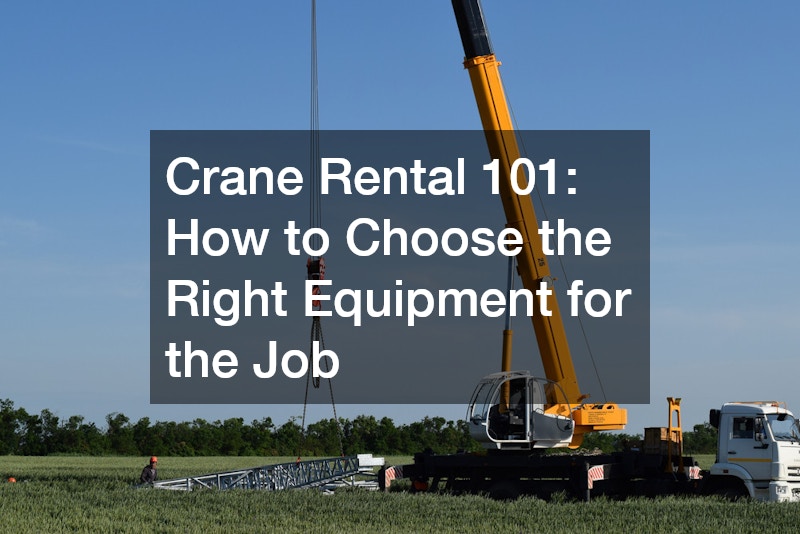Understanding the importance of selecting the right crane for your construction or lifting job is crucial for both safety and efficiency. Choosing the correct crane can significantly impact the workflow on a construction site, minimizing delays and promoting a smooth operation. In this article, we’ll explore the key considerations when renting a crane and how to navigate the process effectively to meet your project’s specific requirements.
Tower Cranes
Tower cranes are indispensable for large-scale construction projects due to their towering height and substantial lifting capabilities. These fixed, tower-like structures are typically used in constructing tall buildings where long-term crane use is necessary.
Their design allows for a 360-degree rotation, providing extensive coverage over a construction site.
The benefits of using tower cranes extend beyond their height capabilities; they also offer significant lifting capacities, which are critical in urban construction settings. The ability to host a crane on-site for an extended period reduces the need for constant equipment turnover. This makes them a cost-effective solution for projects with long timelines.
Despite their substantial operational benefits, the setup and dismantling of tower cranes require meticulous planning and specialized crews. This intricacy emphasizes the necessity for experienced project managers to oversee crane logistics and ensure structural integrity. Ultimately, tower cranes offer incredible efficiency and reliability for high-rise developments and other expansive projects.
Crawler Cranes
Crawler cranes, characterized by their tracked vehicle base, provide significant stability and are ideal for soft ground conditions. These cranes can move under heavy load, which is advantageous for projects with varying lift locations within a single site. The ability of crawler cranes to traverse challenging terrains makes them highly suitable for large infrastructure projects.
Another vital advantage of crawler cranes is their ability to handle extremely heavy loads, often exceeding the capacities of other crane types. Their design incorporates a wider base, improving load distribution and preventing the risk of tipping over. This stability is especially crucial in environments where ground conditions can be unpredictable.
While their transport to the job site can be logistically challenging, requiring disassembly and specialized carriers, their operational benefits far outweigh these challenges. Once set up, their seamless operation and robust lifting capacity serve as essential components for project success. Consequently, crawler cranes are a staple in industries requiring immense lifting power and flexible site movement.
Consulting with a Rental Expert
Consulting with a rental expert is a crucial step in making informed decisions on crane hire. These professionals offer invaluable insights into crane capabilities, operational contexts, and potential risks involved with specific rentals. By leveraging their expertise, you can optimize crane selection and align equipment choice with project demands.
Rental experts assess project needs comprehensively, considering factors like load type, workforce competency, and equipment availability. Their ability to translate technical specifications into practical advice facilitates a more efficient and tailored selection process. Collaboration with rental experts ensures that the correct crane is chosen to foster site safety and productivity.
The guidance offered by rental professionals also extends to compliance with industry standards and safety regulations. Their informed counsel aids in navigating certification requirements, ensuring all rented equipment is approved for use according to local laws. This partnership underscores the importance of expertise in achieving project success through appropriate equipment rental.
Equipment Inspections
Conducting regular equipment inspections is essential for verifying that cranes are in optimal working condition. Pre-rental checklists should be rigorously followed to assess equipment integrity and identify potential faults. Systematic inspections help prevent mechanical failures that can disrupt project timelines.
Beyond initial assessments, routine checks throughout the crane’s tenure on-site are pivotal. These inspections are designed to detect wear and tear resulting from continuous use. Adhering to maintenance schedules and addressing issues promptly contributes to equipment longevity and operational safety.
Documenting inspection outcomes allows for better tracking of crane health and aids in the early identification of recurrent issues. This proactive approach reduces the risk of unexpected downtime and aligns with compliance mandates. Overall, diligent equipment inspections are a cornerstone in promoting a safe and effective work environment.
Site Safety Measures
Implementing site safety measures ensures that crane operations do not compromise overall workplace safety. This involves conducting preliminary site inspections to identify potential hazards and establishing safety zones to delineate crane operation areas. Adhering to these practices mitigates risk and safeguards workers and materials.
Clear communication channels between crane operators, site managers, and ground personnel are vital in maintaining situational awareness and responding to emergencies. Employing technological aids such as radios or headsets can enhance operator-ground communication and prevent accidents during complex operations. Proactive safety planning embeds a culture of safety within the workforce.
Regular safety drills and refreshers are essential for keeping personnel informed on emergency protocols and response strategies. Reinforcing safety measures through training underscores their importance and promotes a vigilant and prepared workforce. Prioritizing site safety exemplifies a commitment to worker welfare and project success.
Choosing the right crane rental involves careful consideration of crane types, project needs, and safety requirements. A well-informed crane selection process fosters operational efficiency and project success, underscoring the importance of diligence and detailed planning. By understanding these factors, you can enhance operational efficiency and ensure the safe completion of your projects.
.

